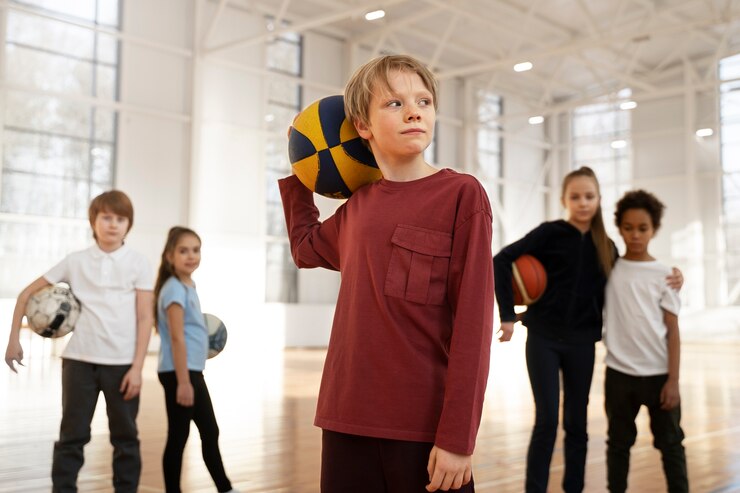Introducing kids to athletics at an early age lays the foundation for their overall development. From a boost in physical fitness to developing sound mental and emotional well-being, athletics significantly shapes children’s futures. Parents and teachers can help children learn key life skills, including teamwork, resilience, and leadership, through participation in sports.
This blog explores the multiple advantages of children in sports, reveals how sports impact their development and unfolds a new understanding of the construction of an intense athletic journey for children.
Corroborative Physical Benefits of Kids in Athletics
One of the most apparent advantages of athletics for kids is improved physical health. Regular sports enhance strength, flexibility, and coordination while promoting cardiovascular fitness.
Muscular Bodies, Strong Minds Engaging in athletics helps kids develop endurance and agility. Running and swimming improve kids’ stamina, while team sports enhance motor skills and overall body control. Otherwise, a healthy lifestyle lowers the risk of childhood obesity, which is a precursory stage to healthier adulthood.
Build healthy habits early. Children who engage in sports are likelier to maintain an active lifestyle into adulthood. Athletics teach them the importance of regular exercise and proper nutrition, forming habits that support long-term health.
Emotional and Mental Growth through Athletics
Apart from physical health, athletics give a child much-needed emotional and mental development. Sports help children develop confidence and enable them to overcome any obstacle.
Build Confidence and Resilience
As kids in athletics master new skills and reach these milestones, their confidence is built. They learn to be resilient in overcoming failures and setbacks that will go beyond the playing field into academic and personal life.
Stress Relief and Mental Clarity
Athletic activities also play the role of a stress reliever. The physical struggle in playing sports releases endorphins, the “feel good” hormones, which make one reduce anxiety and feel better about them. Sport habit fosters psychological clarity of thought.
Social skills with teamwork
The athletic setting of kids developing social skills derives necessary interaction with their teammates, coaches, and opponents. Sports allow children to learn cooperation, communication, and the value of teamwork.
Teamwork and teamwork
Team sports such as football, basketball, and volleyball teach a child to achieve a common goal; he learns to rely on his teammates, be expressive in communication, and fit into a group.
Respect and Sportsmanship
By athletics, one learns to respect the rules and authority, even the opposite team, referees, coaches, and the like. And that is one thing that aids in instilling a perception of fairness and sportsmanship fundamental to personal and social growth.
Academic Benefits of Sporting Participation
Athletics positively impact children’s academic performance by enhancing their cognitive abilities and teaching them time management.
Greater attention and mentalistic capabilities
Studies show that children who participate in athletics concentrate much better and make better choices. Physical activity enhances brain activity, and in children, it ensures the development of the membrane for memory capabilities, problem-solving, and critical thinking.
Time Management and Discipline
Balancing academics and athletics teaches children the value of time management. They learn to prioritize tasks, set goals, and adhere to schedules, skills that prove invaluable throughout their lives.
Long Run Impacts of Sport on Children
Still, the benefits of introducing kids to athleticsextend into adulthood. An early introduction to sports sets the foundation for a lifetime of success and well-being.
Developing Leadership Skills
Sports participation naturally opens pathways to leadership opportunities. Whether captaining a team or mentoring other young players, children in athletics develop leadership qualities that prepare them for the challenges ahead.
Creating Lifetime Friendships
Athletics bonds last a lifetime. Shared experiences on the field or court create irreplaceable friendships and a sense of community.
How to encourage kids to join athletics
Although such benefits are evident, entering athletics usually requires encouragement and support from parents and guardians.
Start with Exploration. Just help kids meet numerous sports and see how exactly things excite them. Individual activities or basketball team sports would be among the favourites. Offer Steadfast Support Be a positive influence by attending games, celebrating successes, and helping your child navigate setbacks. Your encouragement can motivate him to keep pursuing athletics with enthusiasm.
Control of Challenges in Children’s Sports Despite the
Valuable advantages of participating in athletics, kids may face challenges such as balancing academics and sports, competition pressure, or pressure from performing. Managing Balance: Encourage your child to find a balance between books and balls by creating a schedule that includes both. Encourage open communication so that they don’t feel overwhelmed. Beating Performance Anxiety Teach children that success in sports is a win and an effort towards growth. Instead of comparing oneself with others, teach the child to measure their progress.
Conclusion
Encouraging children in athletics fosters holistic development, benefiting them in numerous ways. Athletics is not just about physical activity; it’s a gateway to building life skills that empower children to thrive in various aspects of life.
Physical Benefits and Beyond
Participation in sports develops a person’s physical strength, which is more durable and coordination. But the benefits do not end there. Athletics provide emotional stability and mental fitness. It teaches children how to cope with pressure, come out of setbacks, and remain focused on their objectives.
Acquiring Important Life Skills
Many life skills like confidence, discipline, and leadership are developed through sports for children. On-field issues are very real scenarios in everyday life, teaching the children to problem solve and build teamwork. Thus, children who understand collaboration in soccer or basketball will quickly adopt this team experience in school group assignments or work assignments later in their careers.
Overcoming the Challenges with Support
Though the advantages are plentiful, children athletes can still face the challenges of juggling academics and athletics or facing competition. Parents and communities will be essential in helping these young athletes overcome their challenges. Offering praise, attending their games, and rewarding their efforts over the results will build up their self-esteem and propel them to tremendous success.
A Lifetime Impact
Encouraging children in athletics is not just playing games. It’s shaping future leaders, building a sense of community, and developing habits to ensure lifelong health and wellness. Through sports, children learn the value of perseverance, teamwork, and self-discipline—qualities that prepare them for success both on and off the field.
Investing in athletics for children builds better athletes and well-rounded individuals equipped to lead and inspire.








Leave feedback about this